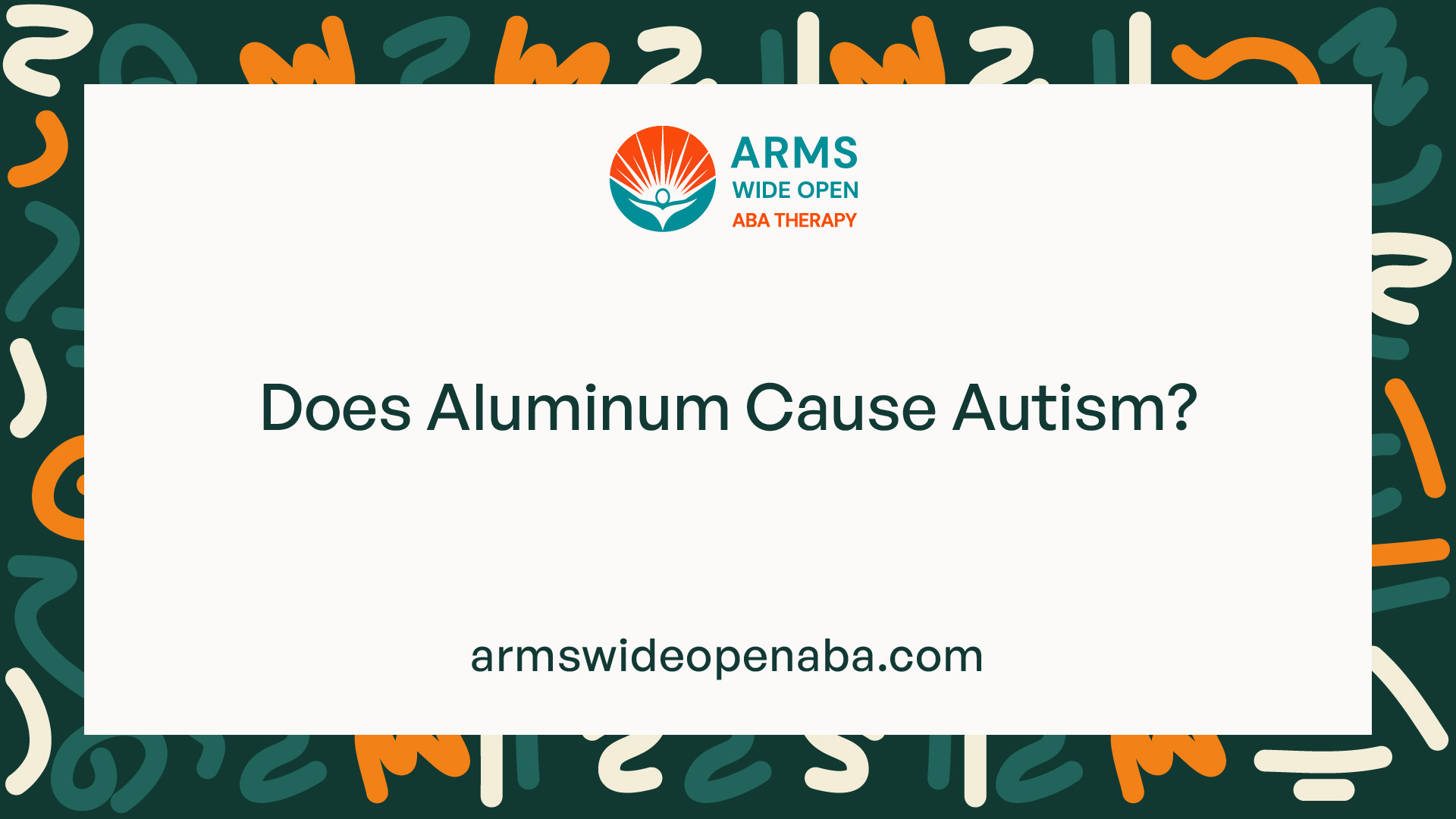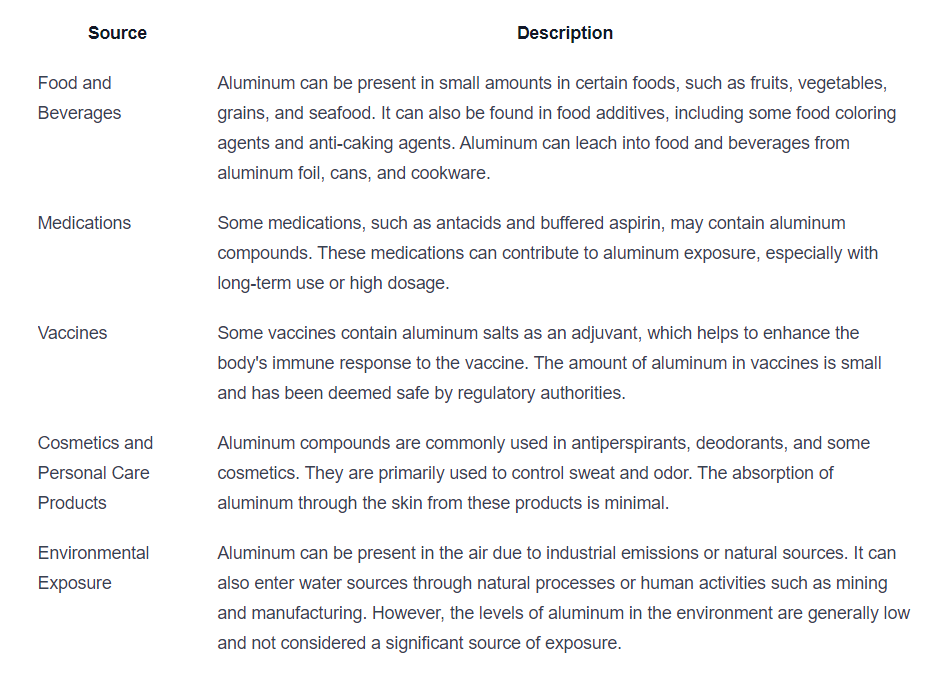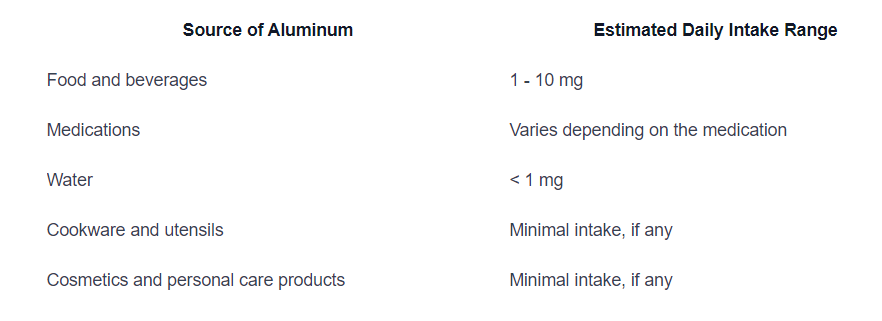Does Aluminum Cause Autism?
Unveiling the truth: Does aluminum cause autism? Explore the scientific evidence and debunk the myths surrounding this controversial topic.

Aluminum and Autism: Debunking the Myths
In recent years, there have been concerns and speculations about a potential link between aluminum exposure and autism. However, it's important to separate fact from fiction and examine the scientific evidence surrounding this topic. Let's delve into the alleged connection and explore the available research.

Understanding the Alleged Connection
The alleged connection between aluminum and autism stems from the fact that aluminum is commonly used in vaccines as an adjuvant to enhance the immune response. Some individuals have expressed concerns that the presence of aluminum in vaccines may contribute to the development of autism spectrum disorder (ASD). However, it is crucial to note that there is no scientific consensus supporting this claim.
Examining the Scientific Evidence
Extensive research has been conducted to investigate the potential link between aluminum and autism. Multiple studies have explored the safety and efficacy of vaccines containing aluminum adjuvants, specifically examining their association with the development of ASD. The overwhelming consensus among scientific experts is that there is no credible evidence to suggest a causal relationship.
Numerous large-scale studies have been conducted to assess the safety and potential adverse effects of vaccines containing aluminum adjuvants. These studies have consistently demonstrated that vaccines are safe and do not increase the risk of developing autism. Here are some key studies:

These studies, along with many others, have been conducted by reputable scientists and organizations, and their findings provide strong evidence against the alleged connection between aluminum and autism.
It's important to rely on evidence-based information when discussing the potential impact of aluminum on autism. Engaging in informed discussions based on scientific research can help dispel myths, alleviate concerns, and promote a better understanding of the topic. While concerns about autism are valid, current scientific evidence does not support a causal relationship between aluminum exposure, particularly from vaccines, and the development of autism.
The Role of Aluminum in the Body
To better understand the potential impact of aluminum on autism, it is important to explore the role of aluminum in the body. This section will delve into the sources of aluminum exposure and how aluminum is processed in the body.
Sources of Aluminum Exposure
Aluminum is a naturally occurring element found in the environment. It can be found in the air, water, and soil. Additionally, aluminum is commonly used in various industries and products, which can contribute to human exposure. Here are some common sources of aluminum exposure:

How Aluminum is Processed in the Body
When aluminum enters the body through various sources, it undergoes a complex process of absorption, distribution, metabolism, and excretion. Here is a simplified overview of how aluminum is processed in the body:
- Absorption: Aluminum can be absorbed into the bloodstream through the gastrointestinal tract, the respiratory system, or the skin, depending on the route of exposure.
- Distribution: Once in the bloodstream, aluminum can be distributed throughout the body. It can cross the blood-brain barrier and accumulate in various tissues, including the brain, bones, and kidneys.
- Metabolism: Aluminum undergoes limited metabolism in the body. The liver is primarily responsible for metabolizing aluminum to facilitate its excretion.
- Excretion: The excretion of aluminum occurs mainly through the kidneys in the urine. A small amount can also be eliminated through the feces and sweat.
It is important to note that the human body has evolved mechanisms to regulate aluminum levels and maintain homeostasis. The kidneys play a crucial role in eliminating excess aluminum from the body. Under normal conditions, the body is capable of handling typical levels of aluminum exposure without adverse effects.
Understanding the sources of aluminum exposure and how it is processed in the body provides a foundation for evaluating the potential impact of aluminum on autism. By examining scientific evidence and addressing concerns, we can promote informed discussions and further our understanding of this complex topic.
Research on Aluminum and Autism
As the alleged connection between aluminum and autism continues to be a topic of discussion, numerous studies have been conducted to investigate this potential link. These studies aim to provide scientific evidence and shed light on the relationship between aluminum exposure and autism spectrum disorder (ASD).
Studies Investigating the Link
Several studies have been conducted to examine the association between aluminum and autism. These studies have utilized different research methods, including observational studies and experimental studies, to explore the potential impact of aluminum on ASD.
A study published in the Journal of Autism and Developmental Disorders analyzed hair samples from children with ASD and compared them to samples from typically developing children. The researchers found no significant differences in the levels of aluminum between the two groups, suggesting that aluminum exposure may not be a major factor in the development of autism.
Another study published in the Journal of Child Neurology investigated the aluminum content in the brains of individuals with autism. The researchers analyzed brain tissue samples and found no evidence of elevated aluminum levels in the brains of individuals with ASD compared to control subjects.
These studies, along with others, have contributed to the body of research exploring the potential link between aluminum and autism. However, it's important to note that research in this area is ongoing, and further studies are needed to provide a more comprehensive understanding.
Conflicting Findings and Limitations
While some studies have found no significant association between aluminum and autism, it's essential to acknowledge that conflicting findings exist within the scientific literature. Some studies have reported a positive correlation between aluminum exposure and ASD, suggesting a potential link.
It's important to consider the limitations of the studies conducted in this area. Some studies have relied on small sample sizes, making it challenging to draw definitive conclusions. Additionally, factors such as individual variability in aluminum metabolism and potential confounding variables make it difficult to establish a clear cause-effect relationship.
Furthermore, correlation does not necessarily imply causation. It's crucial to interpret the findings of these studies with caution and recognize that many complex factors contribute to the development of autism.
As research continues to evolve, it is essential to approach the topic of aluminum and autism with an open mind and rely on evidence-based information. Continued scientific investigation and robust research methodologies will help provide a clearer understanding of the potential impact of aluminum on ASD.
Addressing Concerns and Misconceptions
As the alleged connection between aluminum and autism continues to be a topic of concern, it is important to address the various concerns and misconceptions surrounding this issue. By clarifying misinformation and understanding the risks of overexposure to aluminum, we can gain a more accurate perspective on the potential impact of aluminum on autism.
Clarifying Misinformation
There is a significant amount of misinformation circulating about the relationship between aluminum and autism. It is crucial to separate fact from fiction to ensure an informed discussion. One common misconception is the belief that childhood vaccines, which may contain small amounts of aluminum as an adjuvant, directly cause autism. However, extensive research has consistently shown no causal link between vaccines and autism spectrum disorder (ASD). The overwhelming scientific consensus supports the safety and effectiveness of vaccines in preventing infectious diseases.
Another misconception is the belief that aluminum in everyday products, such as cookware or antiperspirants, can significantly contribute to autism development. While it is true that these products may contain trace amounts of aluminum, the levels are generally considered safe and do not pose a risk of causing autism. The human body has efficient mechanisms to process and eliminate aluminum, minimizing its accumulation.
Risks of Overexposure to Aluminum
While the evidence does not support a direct causal relationship between aluminum and autism, it is important to understand the potential risks of overexposure to aluminum. Prolonged and excessive exposure to high levels of aluminum can have adverse effects on health, particularly in individuals with kidney dysfunction or impaired elimination mechanisms.
Here are some potential sources of aluminum exposure and their estimated daily intake ranges:

It's important to note that the estimated daily intake of aluminum from these sources is generally well below the recommended tolerable intake level established by regulatory authorities. However, individuals with kidney impairment or certain medical conditions may be more vulnerable to the effects of aluminum and should consult with their healthcare providers regarding potential exposure risks.
By addressing concerns and misconceptions surrounding aluminum and autism, we can foster a more informed and evidence-based discussion. While the scientific evidence does not support a direct causal link, it is crucial to continue research efforts to better understand the complex factors contributing to autism spectrum disorder.
Promoting Informed Discussions
When it comes to understanding the potential impact of aluminum on autism, it is crucial to promote informed discussions based on evidence-based information. By relying on scientific research and encouraging further exploration, we can gain a better understanding of this complex topic.
Importance of Evidence-Based Information
In discussions surrounding the alleged connection between aluminum and autism, it is essential to prioritize evidence-based information. Scientific studies conducted by reputable researchers provide valuable insights into the potential relationship between aluminum exposure and autism. These studies follow rigorous methodologies, allowing for a more accurate assessment of the evidence.
To ensure the information we rely on is evidence-based, it's important to critically evaluate the sources of information. Look for studies published in peer-reviewed scientific journals and consider the expertise and credibility of the researchers involved. By relying on reputable sources, we can avoid misinformation and contribute to informed discussions.
Encouraging Further Research and Understanding
While existing research has explored the potential link between aluminum and autism, it is important to acknowledge that the topic requires further investigation. The scientific community continues to conduct studies to expand our knowledge and understanding of this relationship.
Encouraging further research allows us to delve deeper into the complexities surrounding aluminum and its potential impact on autism. By exploring different research methodologies and expanding the sample size, we can gather more comprehensive data. This ongoing exploration will help to clarify any uncertainties and provide a clearer picture of the relationship, if any, between aluminum and autism.
Open and respectful discussions that promote the sharing of scientific findings and encourage further research can lead to a better understanding of this topic. It is through these efforts that we can contribute to evidence-based discussions and collectively work towards unraveling the mysteries surrounding autism and its potential associations with various factors, including aluminum exposure.
Sources
https://www.thetreetop.com/aba-therapy/does-aluminum-cause-autism
https://www.sciencedirect.com/science/article/pii/S0946672X17308763
https://www.nature.com/articles/s41598-020-64734-6
Similar articles
We’re here to help you

Our team is here to assist you in this process. Contact us for any assistance.
it’s easy to apply
We Accept Most Insurances
Our in-network insurance partnerships make ABA therapy more accessible to families throughout our service areas.







Our Insurance Process
We'll request your insurance details to help us verify your plan's coverage for ABA therapy. Once we've received this information, we'll walk you through your benefits, including copayments, deductibles and out-of-pocket maximums, so you know what to expect in advance.
Our team will then handle the preauthorization and all the necessary paperwork.
.svg)





















.jpeg)


































.jpeg)




.jpeg)







.jpeg)











.jpeg)
















